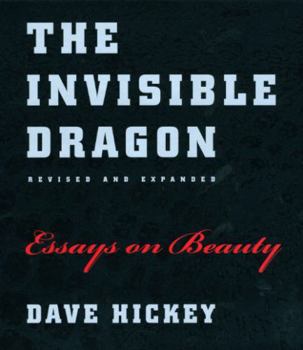The Invisible Dragon: Four Essays on Beauty
Select Format
Select Condition 
Book Overview
The Invisible Dragon made a lot of noise for a little book When it was originally published in 1993 it was championed by artists for its forceful call for a reconsideration of beauty--and savaged by more theoretically oriented critics who dismissed the very concept of beauty as naive, igniting a debate that has shown no sign of flagging. With this revised and expanded edition, Hickey is back to fan the flames. More manifesto than polite discussion, more call to action than criticism, The Invisible Dragon aims squarely at the hyper-institutionalism that, in Hickey's view, denies the real pleasures that draw us to art in the first place. Deploying the artworks of Warhol, Raphael, Caravaggio, and Mapplethorpe and the writings of Ruskin, Shakespeare, Deleuze, and Foucault, Hickey takes on museum culture, arid academicism, sclerotic politics, and more--all in the service of making readers rethink the nature of art. A new introduction provides a context for earlier essays--what Hickey calls his "intellectual temper tantrums." A new essay, "American Beauty," concludes the volume with a historical argument that is a rousing paean to the inherently democratic nature of attention to beauty. Written with a verve that is all too rare in serious criticism, this expanded and refurbished edition of The Invisible Dragon will be sure to captivate a new generation of readers, provoking the passionate reactions that are the hallmark of great criticism.
Format:Hardcover
Language:English
ISBN:0226333183
ISBN13:9780226333182
Release Date:April 2009
Publisher:University of Chicago Press
Length:152 Pages
Weight:0.71 lbs.
Dimensions:0.6" x 6.0" x 7.3"
Customer Reviews
1 rating
Smart book about the nature of beauty and desire
Published by Thriftbooks.com User , 27 years ago
and the role of parental organizations in contemporary society. Hickey's basic premise is that beauty is the agency of visual pleasure. This notion puts Hickey in opposition with a lot of art criticism which is largely concerned with how art is "good for you." Most theorists and scholars are primarily interested in what the art is "saying" -- i.e., interested in art's virtue and ethics but not with its efficacy. Hickey, however, argues that it doesn't matter _what_ the movie is saying unless you like it first. That is, we don't analyze a movie unless we like it. I still don't know if Pulp Fiction, The Silence, or His Girl Friday are good for me, but because I like them, I constantly think about them and their social virtues (if any). Hickey argues that why a work is efficacious in the first place is as important (if not more so) than whether or not its good for you. That's sort of the premise of the book. Hickey explores the reasons why "good for you" replaced "do I like it" and deals with the modern roles of institutions (with nods to Foucault and J. Jacobs) in relation to regulating desire. Hickey's a wonderful writer. The prose is fast, vivid and jocose. Worthwhile for anyone interested in art or beauty.





